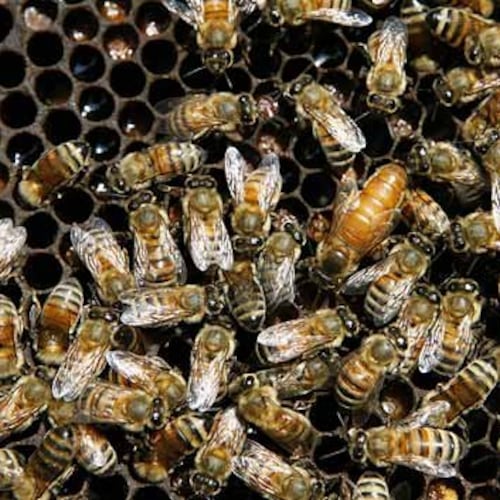CORDELE — When a slow-rolling Ford pickup with a 5-foot mound of watermelons in its bed eases to a halt on a recent morning outside the state farmers market here, Brian Nichols goes to work.
He starts slapping melons. Gently, mind you. Tapping. Patting.
And listening … for the telltale twang of ripeness.
As his right hand tap-tap-pats the melons, he looks like a drummer playing strange botanical bongos. That or someone dribbling basketballs.
“You hear the ping?” he asks.
Yes, you do.
The riper ones emit ringing, higher-pitched peals.
Nichols is an inspector for a company called the Georgia Federal-State Inspection Service. Over the course of a decade, he has developed an ear for what ripe melons sound like.
During the selling season in this town 100 miles north of the Florida border — one that has long billed itself as the world’s watermelon capital — Nichols mans a hut near U.S. 41 and the sprawling market’s front gate.
He visually checks incoming loads for quality, an often brief process that typically includes a smattering of rhythmic pats.
Nichols, try as he might, can’t find a dud in the Ford pickup’s load. But as he makes his way around the truck, one finally thuds.
“It sounds,” he says, “like a flat basketball.”
About 1 in 5 watermelons in the U.S. are grown in Georgia, trailing only Florida, according to the U.S. Department of Agriculture. The Cordele State Farmers Market is the major watermelon distribution hub for the Southeast from early June through August.
Nichols and other USDA-licensed private inspectors like him in Cordele are there on behalf of the state’s agriculture department to help ensure that low-grade melons don’t make it to market.
That’s especially important when it comes to a watermelon because once it’s cut from the vine and carried away, it won’t keep ripening, unlike a tomato.
Nichols’ melon-patting method has been around for ages and is used, no doubt with varying degrees of success, by pretty much anyone who has ever purchased one. The oblong gourds are imminently thumpable.
In 1937, an Associated Press dispatch on the eve of Georgia’s watermelon harvest noted that “many retailers use the ‘thump method,’” explaining that “a green melon has a sharp, metallic sound; a ripe one emits a hollow or muffled tone.”
A decade earlier, though, an item in the Macon Telegraph more or less told readers, Yeah, good luck with that: “Among the deep problems that we have met and passed up as not understandable is why we can’t tell a ripe watermelon from a green one, why we can thump a wagon load, a car load or a field full of them and note with care the varied gradations of sound and be ready to swear on a stack of Bibles a mile high on one being just exactly ripe when it wasn’t.”
Nichols is wary of the thump method.
“The thump really doesn’t work unless you’ve got a giant finger,” he says. “The thump sounds the same to me on (a good one and a bad one). I pat them, and I can definitely tell between a good and a bad melon.”
Credit: Joe Kovac Jr.
Credit: Joe Kovac Jr.
Across the lot at the market’s main entrance sits a canopied fruit stand named the Melon Shack.
Ana Gomez, a melon seller and recent graduate of Crisp County High, is well on her way to mastering the patting method.
When a customer walks up eyeing the deep-green Sugar Baby melons that are cannonball-round and lollipop-sweet, Gomez commences patting.
“If it sounds hollow-ish or like a basketball, it’s because it’s ready to eat,” Gomez says. “Now if it sounds flat, it’s not good.”
Melon Shack proprietor Ricky Cruz has been in the fruit business for about 15 years. When he lived in Florida, for a time, he worked trimming tree limbs near power lines. One day, a friend asked him to join him picking cantaloupes. Cruz later moved to Georgia and gravitated to the melon industry.
He has long since learned all manner of ripeness-gauging techniques. One method involves inspecting their bottoms, the parts that rested on the ground in the patches where they grew. On ripe ones, that part of their otherwise green skin is buttery yellow.
“There’s so many different ways,” Cruz says. “And the thumping, of course.”
He has an impeccable ear, by the way. It can be a curse.
His sister, Dora, who lives in Texas, will sometimes call him out of the blue while she’s grocery shopping. “She’s like, ‘Hey, you got a minute.’ I’m like, ‘Yeah, what you got?’”
Next thing he knows, she’ll say, “Listen to this.”
Then comes a tap-tap-tapping — the sound of her in a supermarket trying to pick out a watermelon.
“Aw, come on,” Cruz will say, “not over the phone.”
But his sister persists.
She’ll loop him in on FaceTime, all in pursuit of a pitch-perfect ping.
“OK,” he will tell her, “that one on the right.”
Credit: Joe Kovac Jr.
Credit: Joe Kovac Jr.
Editor’s note: “Dispatches” are occasional snapshots of people, places, scenes or moments from around Georgia that our reporters come across. They aim to be immersive and aren’t always tied to a news event.
About the Author
Keep Reading
The Latest
Featured





